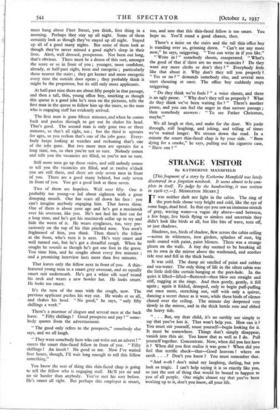STRANGE VISITOR
By KATHERINE MANSFIELD [This fragment of a story by Katherine Mansfield was lately discovered in a forgotten notebook. It seems almost to be com- plete in itself. To judge by the handwriting, it was written in 1916-17.—J. MIDDLETON MURRY.] IT was neither dark nor light in the cabin. The ring of the port-hole shone very bright and cold, like the eye of some huge, dead bird. In that eye you saw an immense stretch of gray, waving water—a vague sky above—and between, a few huge, live birds flying so aimless and uncertain they didn't look like birds at all, but like bits of wave, torn off, or just shadows.
Shadows, too, birds of shadow, flew across the cabin ceiling —across its whiteness, iron girders, splashes of rust, big nails coated with paint, paint blisters. There was a strange gleam on the walls. A tiny day seemed to be breaking all on its own in the mirror above the washstand, and another tide rose and fell in the thick bottle.
It was cold. The damp air smelled of paint and rubber and sea-water. The only thing of life in the silent cabin was the little doll-like curtain hanging at the port-hole. In the quiet it lifted—lifted—fluttered—then blew out straight and stiff, tugging at the rings. And then gently, gently, it fell again ; again it folded, drooped, only to begin puff-puffing out once more, stretching out, stiff with only a quiver, dancing a secret dance as it were, while these birds of silence chased over the ceiling. The minute day deepened very slowly in the mirror, and in the thick bottle rose and ebbed the heavy tide.
. . . But, my dear child, it's no earthly use simply to say that you've lost it. That won't help you. How can it ? You must stir yourself, rouse yourself—begin looking for it. It must be somewhere. Things don't simply disappear, vanish into thin air. You know that as well as I do. Pull yourself together. Concentrate. Now, when did you last have it ? When did you first realise it was gone ? When did you feel that terrific shock—that—Good heavens ! where on earth . . . ? Don't you know ? You must remember that.
"And o-oh ! don't mind my laughing, darling, but you look so tragic. I can't help saying it is so exactly like you, so just the sort of thing that would be bound to happen to you of all people. One might almost say that you've been working up to it, don't you know, all your life. "Lost, stolen or strayed. We shall have to advertise. Three shillings a line for the first two lines, and something enormous a word afterwards. You don't think I'm cruel, do you, pet ? Everything has its funny side, hasn't it ? And if one can bring one's sense of humour to bear upon a thing, what can be better ? Don't you agree ? Of course, I'm a philosopher. I don't believe there's a single thing we aren't really better without. But I can't expect you to agree with that. Cheer tip ! We've only one life after all. That's cheap, I know—but you could not say a truer thing—not even if you were willing to spend millions on it.
" If I were you, I should put it all out of my mind—make a fresh start—behave as though it was not. Ah, I know that sounds hard to you now, girlie. (You don't mind me calling you ' girlie ' and just patting your hand as I do ? I enjoy it. And the tremor you can get on ' girlie ' ! Mar- vellous !) But Time heals all. Not with his scythe, dear. No, with his egg-timer. My facetious way of saying his hour-glass. Ha ! Ha ! Ha ! . . . You hate me, I know. Well, I'm just going. But one day, if you are honest with yourself, you will remember, and you will say, ' Yes, she was right and I was wrong—she was wise and I was foolish.' " The odious little creature, who had been sitting on the edge of the lower berth, drew on a pair of dirty white kid gloves, tucked her tail under her arm, gave a loud, high cackle, and vanished.
The figure on the bunk gave no sign. She lay on her back, her arms stretched down by her sides, her feet just touching the wooden rim at the end of the berth, the sheet up to her chin. Very pale, frowning, she stared at the spot where the little monkey had been sitting, shut her eyes, opened them, looked again—nobody was there. And the night was over. It was too late to expect any- body else.
She shut her eyes again. A great, loud pulse beat in her body. Or was it in the ship ? In the ship. She had no body. She just had hands and feet and a head—nothing else at all. Of course, they were joined together by something, but not more than the stars of the Southern Cross were joined together. How otherwise • could she feel so light, so light ?







































 Previous page
Previous page